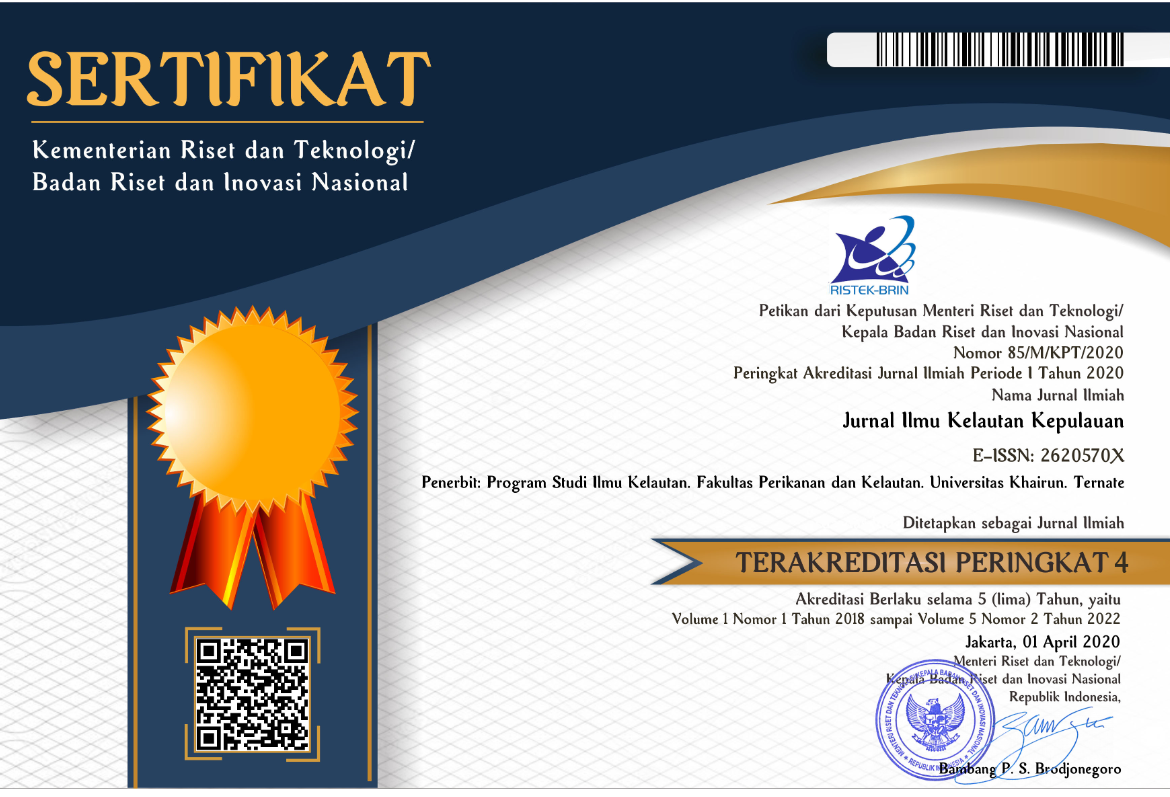Strategi Pemanfaatan Lahan Mangrove untuk Pengelolaan Tambak Berkelanjutan di Kabupaten Lombok Timur Bagian Selatan, Nusa Tenggara Barat
Abstract
Full Text:
1282-1295 (Bahasa Indonesia)References
Ahmed, N., Thompson, S., & Glaser, M. (2018). Integrated mangrove-shrimp cultivation: Potential for blue carbon sequestration. Ambio, 47(4), 441–452. https://doi.org/10.1007/s13280-017-0946-2
Akram, H., Hussain, S., Mazumdar, P., Chua, K. O., Butt, T. E., & Harikrishna, J. A. (2023). Mangrove Health: A Review of Functions, Threats, and Challenges Associated with Mangrove Management Practices. In Forests (Vol. 14, Issue 9). Multidisciplinary Digital Publishing Institute (MDPI). https://doi.org/10.3390/f14091698
Arifanti, V. B., Sidik, F., Mulyanto, B., Susilowati, A., Wahyuni, T., Subarno, Yulianti, Yuniarti, N., Aminah, A., Suita, E., Karlina, E., Suharti, S., Pratiwi, Turjaman, M., Hidayat, A., Rachmat, H. H., Imanuddin, R., Yeny, I., Darwiati, W., … Novita, N. (2022). Challenges and Strategies for Sustainable Mangrove Management in Indonesia: A Review. In Forests (Vol. 13, Issue 5). MDPI. https://doi.org/10.3390/f13050695
CAHYANINGSIH, A. P., DEANOVA, A. K., PRISTIAWATI, C. M., ULUMUDDIN, Y. I., KUSUMAWATI, L., & SETYAWAN, A. D. (2022). Review: Causes and impacts of anthropogenic activities on mangrove deforestation and degradation in Indonesia. International Journal of Bonorowo Wetlands, 12(1). https://doi.org/10.13057/bonorowo/w120102
Carugati, L., Gatto, B., Rastelli, E., Lo Martire, M., Coral, C., Greco, S., & Danovaro, R. (2018). Impact of mangrove forests degradation on biodiversity and ecosystem functioning. Scientific Reports, 8(1). https://doi.org/10.1038/s41598-018-31683-0
Djumanto, Erdi Lazuardi, M., Musthofa Zainudin, I., & Ridarwati, S. (2022). The Role of Marine-Protected Areas as A Life Support for Fishery Communities: Indonesian Perspective. In Protected Area Management - Recent Advances. IntechOpen. https://doi.org/10.5772/intechopen.100214
Goldberg, L., Lagomasino, D., Thomas, N., & Fatoyinbo, T. (2020). Global declines in human-driven mangrove loss. Global Change Biology, 26(10), 5844–5855. https://doi.org/10.1111/gcb.15275
Newton, A., Icely, J., Cristina, S., Perillo, G. M. E., Turner, R. E., Ashan, D., Cragg, S., Luo, Y., Tu, C., Li, Y., Zhang, H., Ramesh, R., Forbes, D. L., Solidoro, C., Béjaoui, B., Gao, S., Pastres, R., Kelsey, H., Taillie, D., … Kuenzer, C. (2020). Anthropogenic, Direct Pressures on Coastal Wetlands. In Frontiers in Ecology and Evolution (Vol. 8). Frontiers Media S.A. https://doi.org/10.3389/fevo.2020.00144
O’Sullivan, J. N. (2020). The social and environmental influences of population growth rate and demographic pressure deserve greater attention in ecological economics. Ecological Economics, 172. https://doi.org/10.1016/j.ecolecon.2020.106648
Salunke, M., Kalyankar, A., Khedkar, C. D., Shingare, M., & Khedkar, G. D. (2020). A Review on Shrimp Aquaculture in India: Historical Perspective, Constraints, Status and Future Implications for Impacts on Aquatic Ecosystem and Biodiversity. In Reviews in Fisheries Science and Aquaculture (Vol. 28, Issue 3, pp. 283–302). Taylor and Francis Inc. https://doi.org/10.1080/23308249.2020.1723058
Sanka, I., Kusuma, A. B., Martha, F., Hendrawan, A., Pramanda, I. T., Wicaksono, A., Jati, A. P., Mazaya, M., Dwijayanti, A., Izzati, N., Maulana, M. F., & Widyaningrum, A. R. (2023). Synthetic biology in Indonesia: Potential and projection in a country with mega biodiversity. Biotechnology Notes, 4, 41–48. https://doi.org/10.1016/j.biotno.2023.02.002
Suharti, S., Darusman, D., Nugroho, B., & Sundawati, L. (2016). Economic Valuation As a Basis for Sustainable Mangrove Resource Management A Case in East Sinjai, South Sulawesi. JMHT, 22(1), 12–23. https://doi.org/10.7226/jtfm
DOI: https://doi.org/10.33387/jikk.v8i2.10649
Refbacks
- There are currently no refbacks.
Â
Â
Â
 | Address : Marine Science Study Program, Faculty of Fisheries and Marine Science - Khairun University, Ternate, North Maluku, Indonesia |






